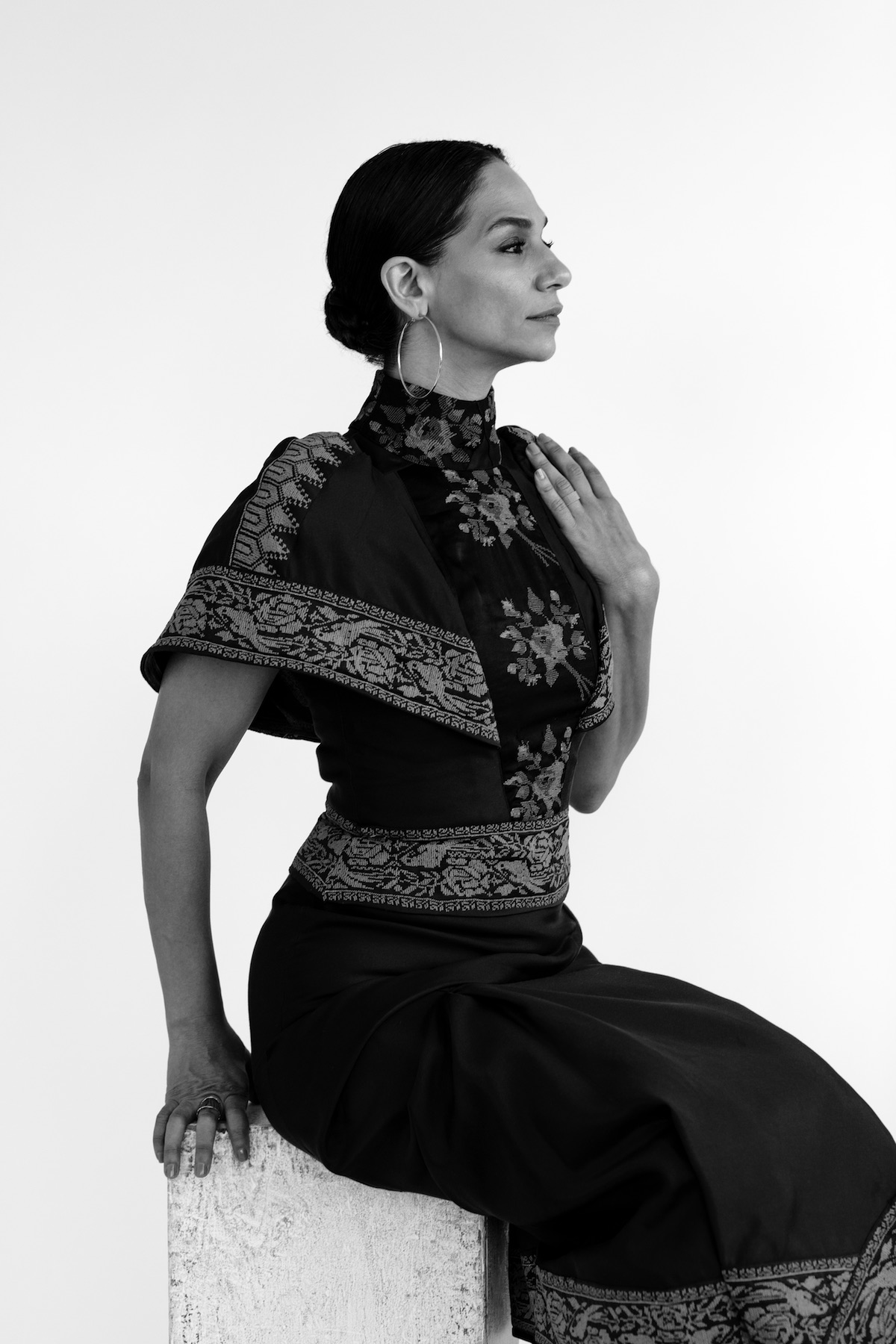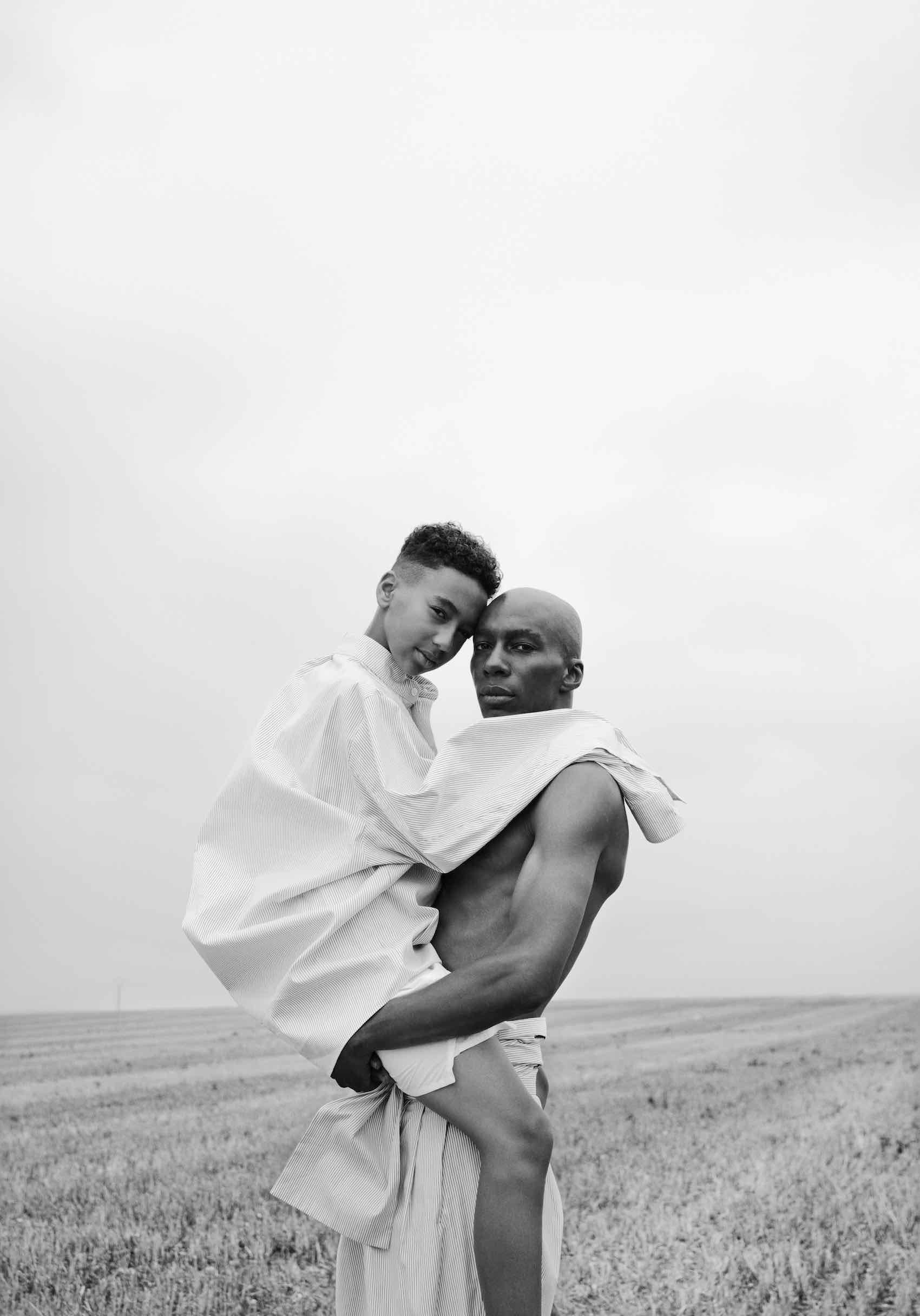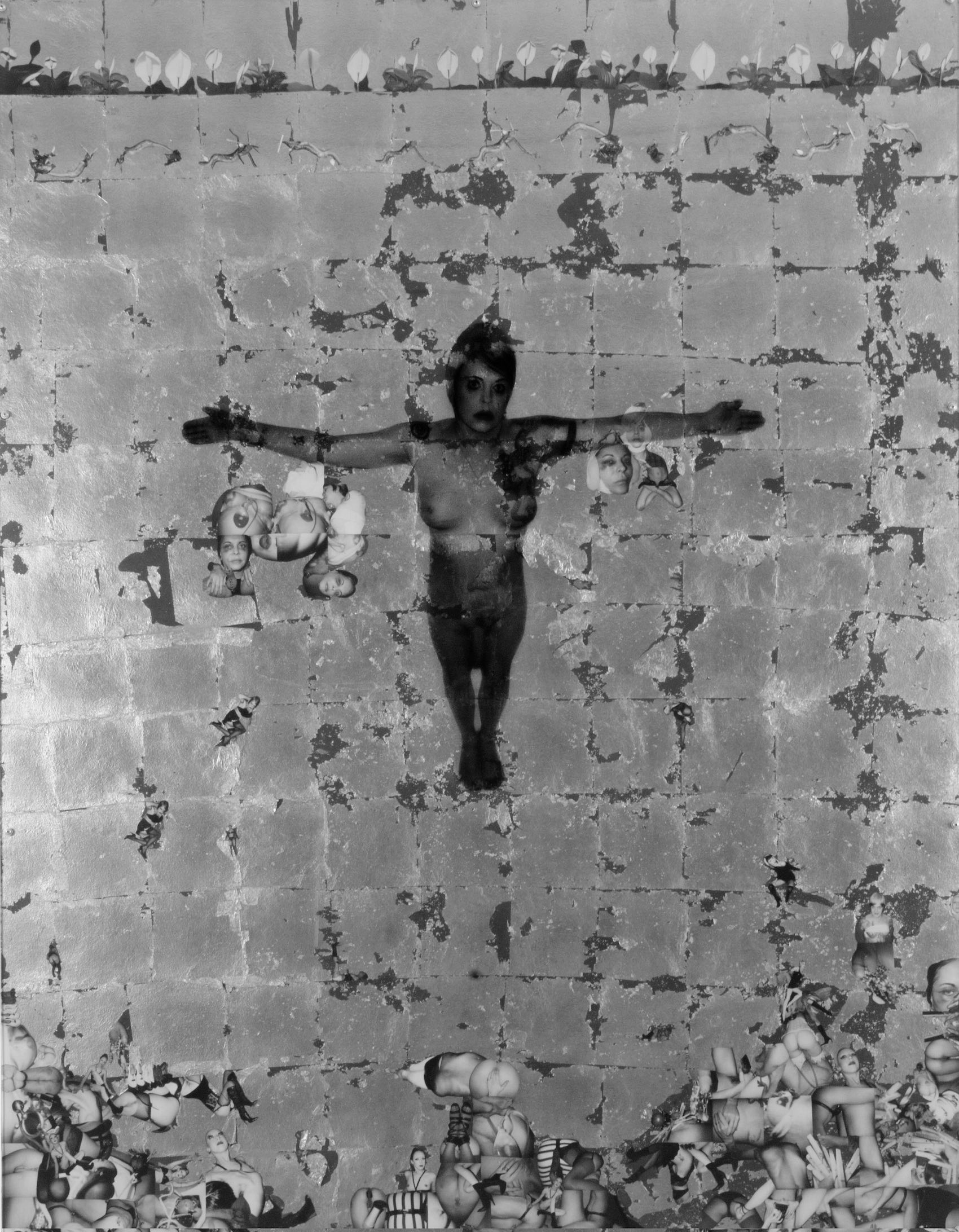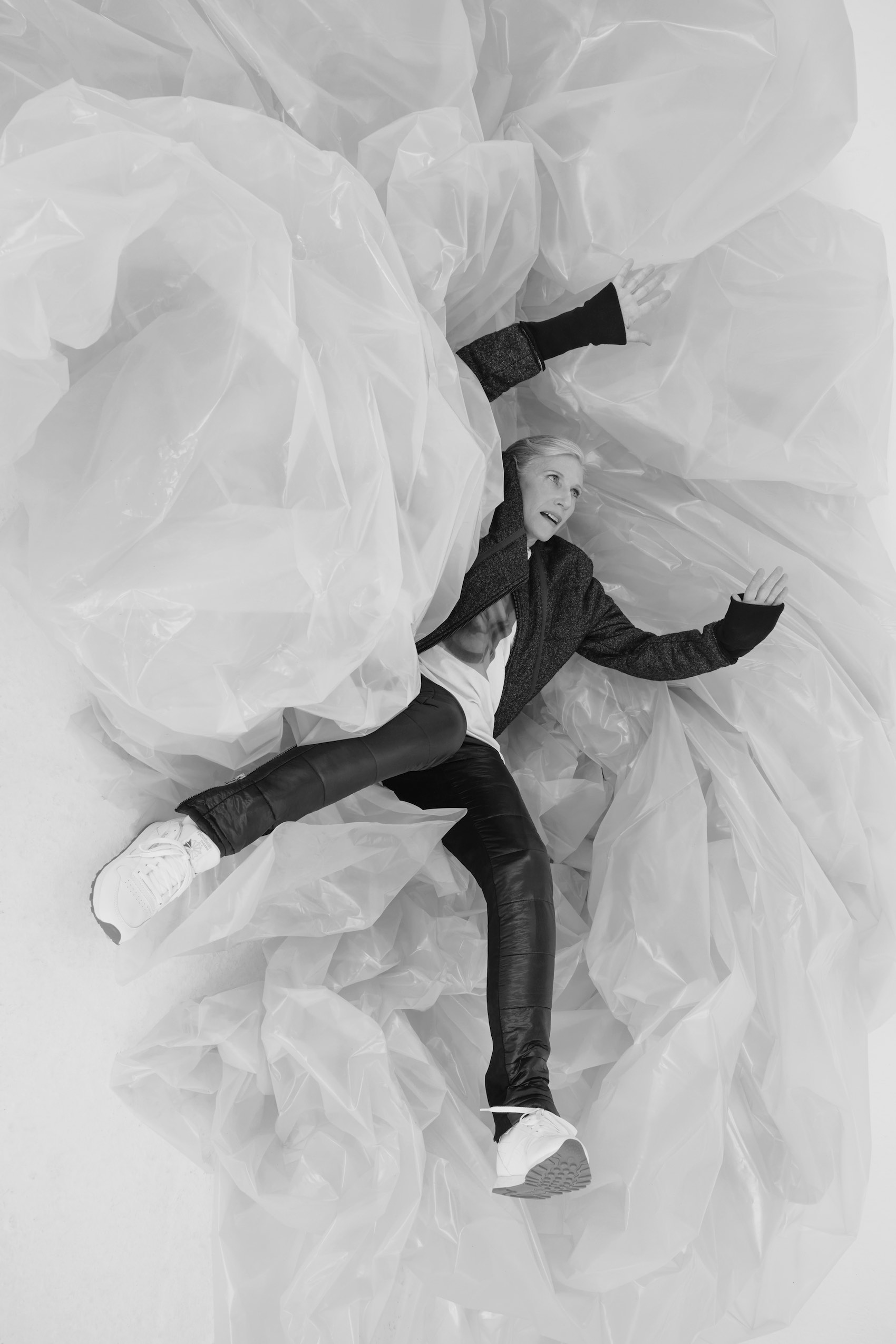In her own words, Hoda Katebi is “a Chicago-based angry daughter of Muslim-Iranian immigrants,” author of the book Tehran Streetstyle, community organizer, and the voice behind the radical, political online fashion publication JooJoo Azad. Here, she speaks with Palestinian-American human rights attorney, artist, educator, and writer Noura Erakat, who has time and again stunned and stupefied the media in bold, brazen, sensibly unapologetic interviews. Katebi and Erakat’s conversation is akin to two streams flowing parallel to one another, embarking upon the surfaces and diving into the depths of politics, art, activism, identity, and gender norms, ultimately joining forces in the same body of water, not in competition but in support of one another—level and determined, headstrong, open to the elements.
—
Hoda Katebi: Do you think that all art is political?
Noura Erakat: I mean, I’m trained as an attorney. I’m hesitant to make such an absolute statement. Politics is basically the negotiation over scarce resources, and it’s the work that’s being done to actually negotiate that distribution. Art is expression, some sort of expression, any kind of expression, right? It’s a visionary aide. It’s a manifestation. That could be political in two ways: What is it that the artist chose to represent as opposed to anything else, and then how does creation implicate a discussion around the distribution of scarce resources?
I don’t identify as an artist because it’s political. I identify as an artist because I think that it’s a way of being. An artist is someone who can transcend an immediate material reality to be able to define yourself on your own terms, and to want to see the world on terms that may not yet exist. So those are the things that I think define an artist, which is not being bound by what is, but instead being in the constant act of creating what could be. A lot of the time it does come from people who hold privilege who say that they don’t want their art to be political or simultaneously call out Palestinians or black folks and say, “Oh, why do you always create political art?” It’s almost like my entire life. It’s triggering to you.
HK: What role does art play for you, and especially as a Palestinian, why is it important?
NE: So, I just want to be clear: I identify as an artist because I think that that’s the best way, because a lot of people see me, and they’re, “Oh, Noura’s a lawyer. Oh, Noura’s a teacher. Oh, Noura …” You know what I mean?
HK: Yeah.
NE: And I feel like rather than be defined by the actual profession, I want to be defined by the way I relate to the world in it. Me being an artist is not me defining my career or my productivity. It’s my relationship to time. I’m also identifying as queer, right? it’s not who you’re attracted to; it’s how you’re manifesting yourself in the world outside of binaries. I want to live.
I’ve written two plays, and I’ve fallen out of that—it’s a practice, like anything, and I haven’t been keeping it up. But last fall, the Kennedy Center invited the DC Palestinian Film and Arts Festival, which I am a co-founder of, to curate a program for the Millennium Stage. I got to direct the program, which meant musical direction, light direction, you know, all the stage work, plus it’s a play that I wrote, and I directed the professional actress who performed it. It was actually such a miracle, because we only got to do one stage rehearsal an hour before the program started.

“I want to give you enough facts and information for you to make your own decision. That’s so much more powerful when you have to engage with me and do the work with me. You have to think about it.”
The DC Palestinian Film and Arts Festival began because in 2011, I had been co-leading something called the U.S. Palestinian Community Network, and we had created a local chapter in D.C., and all of the work that we were doing as part of that network was, I thought, very reactionary. No to negotiations. No to these terms of the peace process. No to the split. I knew, I knew that that was not going to last because that’s not something that sustains. It creates a lot of toxicity.
On a trip to Toronto, I was speaking in Toronto and my good friend introduced me to her project, the Toronto Palestine Film Festival, and I thought to myself, oh my God. That’s it. We have to create something that will outlast the politics of rejection. We have to create something that lives on its own terms. So when I got back, I and two other women co-founded this project, and now we’re in our eighth year. It is not a Palestine film festival; it is a showman arts festival. Our whole purpose is to showcase the artists, whoever they are. You could be talking about your favorite color or your favorite candy or the way your mom screwed you over and still left it in your head. The whole point is to showcase the artist and all of the different media that they use, visual, performing, cross stitching, cooking, music, dance, the whole thing.
This is where we’re dreaming of the future. This is where we’re creating. Who are Palestinians? Who are young Palestinians don’t know anything about it? From what they feel, from what their family passed onto them—how are they expressing that? And that is the future of Palestine. We’re trying to cultivate the space where they can dream. What the diaspora looks like and what the community looks like beyond just, what are the political terms upon which this will be resolved? Instead it becomes a social question, more like, what do people look like? What does trauma feel like? What is joy? What is internal conflict? What languages do we speak in this space? It also becomes one of the best tools for mainstreaming the question of Palestine. We’re bringing out audiences that probably feel like the whole thing is toxic.
HK: Yeah, it’s like a language that transcends border and culture. You create really accessible work. So, how are you able to transcend that really difficult box that lawyers are taught to be sitting in?
NE: I went into law school because I wanted to fight, and I thought, if only we had these tools we could just reason through this, then we can get out of the binds that politics had created for us, and we’ll just reason through it through some arbiter. We just listen to each side, and we can figure it out, and in fact, that was a really jarring lesson, and one of naivety, and it’s become the source of inspiration for my forthcoming book, Justice for Some: Law in the Question of Palestine, which will be out in March 2019. First of all, I barely survived the damned thing, because it is the single most white, heteronormative, classist, stifling space—
HK: Say it.
NE: —you can ever imagine. It is basically where you go to protect and revere the status quo. My issue with law school is that you take that for granted. Nobody admits that that’s what it is, and you start to act like everything that you’re studying is objective when everything is so not objective.
HK: Everything that you produce, whether it’s academic in the legal industry, you’re coming from your particular perspective of the world. Oppressed or oppressor.
NE: True, but there’s a different kind. Let me give you an example. When you’re studying property law in the United States, all property law is built upon a logic of dispossessing native nations, indigenous nations in the United States. And here you are studying concepts like liens, trusts or estates, possession, but you never ever talk about, well, what is the root of this whole model? The root of it is the dispossession of indigenous nations.
Or when we talk about criminal law: We want to talk about the death penalty as a jurisprudential matter, which means we’re just going to look at the case law, but we’re not going to talk about, how is it that the law itself and the way that the death penalty becomes instrumentalized is specifically to punish black people?
“I feel like that’s the risk that’s worth taking. I want to know that I spent all the time I had breathing, able-bodied and able-minded, to produce the work that I thought was critical and necessary.”
I had a really hard time in law school. I ended up getting a big award at the end, which was like a vindication, but I almost didn’t even go to my graduation because I was just like, this was miserable. Afterwards, I didn’t even take a traditional law job. I went to Berkeley Law, and after law school, I got a fellowship for something like 30, 35k. That’s insane for a recent law graduate, and then there was no such thing as working as a Palestinian-rights lawyer, so I had to create my own job. It was a coup to even get the fellowship.
I’m now in a place where I have some stability, but from the time I graduated until now, I came onto the tenure track in the academy basically hustling. Nobody wants to … It’s just a difficult story. I mean, you have to be crazy to be doing this work. If I wasn’t crazy, I wouldn’t have lasted this long.
HK: What has got you through?
NE: I kept pushing. I kept being a lawyer. I went back to school, and I kept writing like a lawyer. I kept appearing on television like a lawyer until more recently. I think until last December, when I started to appear on TV and in public spaces, a little less as an attorney and more like as a human being and a Palestinian, that, I think, was a major turning point for me and for people receiving me, because when I’m talking as a lawyer, you know, I’m basically trying to be removed from it, just making the argument and letting it stand, but when I step into my skin as a Palestinian, as a human being, it’s me.
I’m still going to use logic as my primary communication tool, and everybody has a different way they like to communicate in public. Some people like to tell stories. Some people like to move you, just really deeply move you and rally you to fight and believe. I think logic is really compelling. I do it in the same way when I’m in my classroom. I don’t ever tell you what exactly to believe. I want to give you enough facts and information for you to make your own decision. That’s so much more powerful when you have to engage with me and do the work with me. You have to think about it.
For me, legal practice basically means that I’m an advocate. Because what is human rights advocacy? There’s no courtroom. What does it mean, then, to be a human rights attorney? It means that I am making a case in the world of public opinion. That’s my courtroom.
HK: What got you out of bed every day during this period? Were you also doing art at the same time, or did art come later?
NE: I was producing art while I was in law school as a writer. I dabbled in poetry, but I did the theater work. My first play is based on oral histories that I collected.
I’m in the West Bank in 2000, when the second intifada begins. I’m a student at Hebrew University [of Jerusalem], which was a whole story unto itself, but I’m the only student at Hebrew U that is a Palestinian and living in what’s known as the West Bank. And so basically, school gets shut down, because the intifada has started, and I had come eager to do an oral history project. I thought it was going to be about young girls and women. I started traveling to interview families of the slain, of the killed, and to get the stories of those killed, and so I collect all of these stories and come back. I transcribe them, and then I turn that oral history project into a revolving monologue, which is like a one-act play for about an hour where you get to hear almost all of the stories being told by the characters themselves as they’re describing their loved one who’d been killed.
So, I write that while I’m in law school. I produce that. I direct that. It takes its own life, and it’s performed in different places. I then come to do another monologue, but this time it’s a one-woman show, and I perform that one everywhere. And that was it. That space just killed my creative spirit.
HK: Do you see yourself within the legacy of any artist that you look up to? Whose tradition do you feel that you belong to, if any?
NE: The first person that comes to mind is Arundhati Roy.
HK: Bae!
NE: Right? Here is this woman completely committed to revolutionary justice and transformation but who is expressing herself also as a dreamer, as a novelist, and as an essayist, and so I really like that. It’s these visionary women who are immersed and accountable to a base and to a movement. They don’t see themselves as above or as being revered. They see themselves as being a part of something bigger than them. What you’re seeing in their work is homage to it, paying respect to it, and creating space for it.
HK: Situating yourself in the West as a site of knowledge production in academia, which is heavy orientalist, perpetuates a lot of racism, the same ways that you mention about the law. What are your experiences there, and what made you become an educator?
NE: I think in everything that I’ve done, I’ve always been an educator. Even as an activist or when I’m leading workshops at different universities from before I got into law school.
The difference about entering the academy is now you’re producing knowledge in a way that’s refereed and becomes subject to academic and scholarly scrutiny. A lot of circumstances pushed me into that field, and also because I’m increasingly unfulfilled by the legal practice, which I find is so hampered by the question of politics and by political issues. I’m increasingly frustrated with the limitation of the law, but also more curious about it. Why is it working in this way? What is it about the law, what is it about politics? And so these became scholarly inquiries that push me out, like make me more disenchanted with being a lawyer.
Once I’m in the academy, now it’s like a whole different set of challenges. It becomes the most stark when people of color talk about justice issues that are difficult conversations. So, if I was talking about FGM and the Muslim community, I don’t think people would receive me harshly. It might even be kind of okay, because I’m not challenging the establishment. But being of color, producing knowledge that is counter-hegemonic is when you raise a lot of flags, and immediately people begin to question whether you’re an academic or an activist. It’s one thing if somebody was studying these things. It’s another if you’re invested in them and studying them. That’s been a really difficult challenge, how to toe that line.
It’s a lot of unknowns, like you’re saying. For me, I’m leaving the choice to myself. I write about what I find the most interesting, intriguing, because that’s what’s the most authentic, and that’s the work that I do best, when I enjoy what I’m doing. But there is great risk in doing the work in that way. I feel like that’s the risk that’s worth taking. I want to know that I spent all the time I had breathing, able-bodied and able-minded, to produce the work that I thought was critical and necessary, rather than produce the work that I thought was going to help me climb some sort of career ladder.
HK: Because at the end, you always get exposed anyway.
NE: Maybe it’s about getting exposed, but I feel like it’s between you and yourself. What is it that you want at the end of the day? What is going to make you happy? So, yeah, I’m taking a risk, but everything else that I’ve done has been a risk. Right?
HK: Yeah. And with all of these risks, what are the joys of being an educator?
NE: Oh my God, the students. There’s so much tremendous joy. There’s so much tremendous joy in their capacity and their imagination and their passion, and the community that they create with one another. In finding folks who want to create an alternative world based on a place of love and a place of vision and a place of hope and a place of faith. All of that is joyful. I believe that the revolution will be full of joy. I know the revolution to be full of joy. It’s also full of tremendous heartache, but we already know that, right? But when we fight, we don’t just fight because we’re sad and because we’re angry. We fight because we believe we can. We believe we can. We believe we should.
HK: And we have no choice.
NE: We believe we are better. And that’s so joyful.
HK: And that also takes me to the very last question that I’ll ask: What is the world that you’d like to see?
NE: Well, there’s the really nerdy answer, which is to see a world where if we are to have governments, the governments are to be run by people for the sake of people, where profit is not a determinative logic, where the distribution of wealth is not concomitant with some neo-liberal equation of productivity and earnings and market formulations, but rather based on need. That’s a world that I would love to live in.
I would like to live in a world where we’re actually honoring the earth. We are depleting this earth at such a fast rate, at such a disrespectful rate, that we’re not going to have an earth to even divide by the time we figure out how to get along with one another and get over our human conflict. That’s why billionaires are trying to figure out their exit route to Mars and life elsewhere. Environmentalism isn’t this side thing. It’s central to everything that we do, and it’s entwined with indigenous justice as well, people who have already told us how to treat this earth and how to make it sustainable.
HK: That’s beautiful. Well, thank you so much. Is there anything that you wanted to say that we didn’t get to touch on?
NE: One of the things that made me most excited about the invitation by Suited, the first thing I thought of, was that I wanted Rami Kashou to dress me, because I saw him on Project Runway and he didn’t identify as a Palestinian. I knew he was Palestinian, but he was just out there being a designer, and in watching him, I found freedom. I thought, that is what freedom will mean for Palestinians, when they can just be in the world and not have to be defined by our fight. We can just be defined by whoever we want to be. “I’ve been fangirling you for 12 years. You want to dress me?” So we meet, and he dresses me, and if you notice … I don’t know if you’ve seen the photos.
HK: I haven’t.
NE: It’s like artwork. Literally the only other person who’d worn what I wore for this photo shoot was a mannequin at a museum. It is exactly what I envision the future of Palestine to be, which is taking our tradition and our history and our past, but not going back to it or being stuck in it. It’s taking it and creating something absolutely new and visionary. It’s Palestinian futurism, and it was … that is such a central piece of the photo shoot, of this story, of what art is doing, of my own vision of: What does it take for us to create these new futures? And at the heart of it, it means not being afraid to dream.


